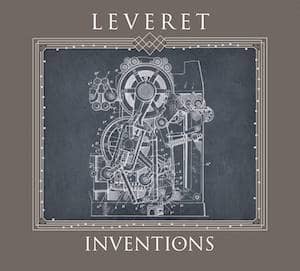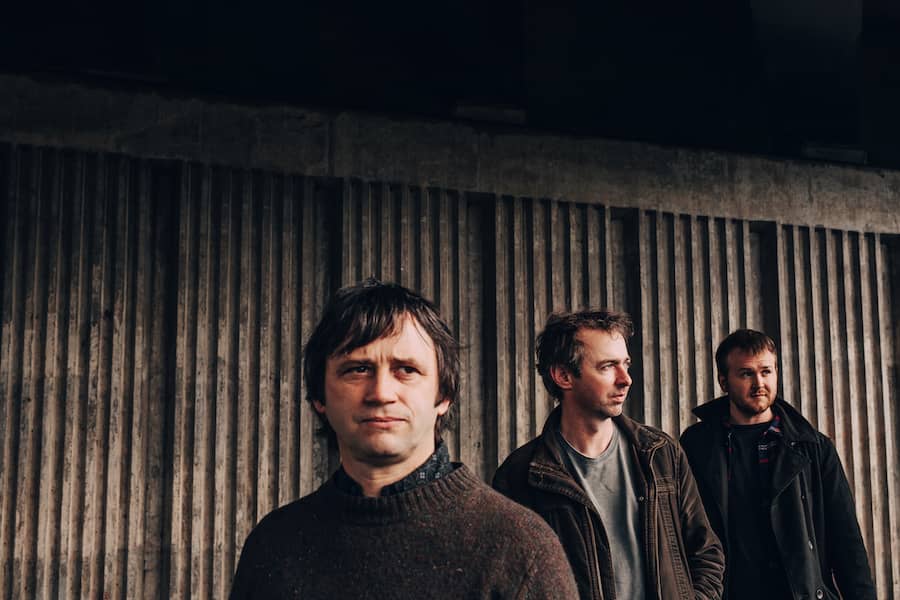 Leveret – Inventions
Leveret – Inventions
Rootbeat – 15 September 2017
Melodeon, concertina and fiddle. Nothing else: no words, no conventional percussion or bass, no found sounds or field recordings. Just three guys playing these three stereotypically traditional instruments. But this is Leveret, and, as always where they are concerned, the very idea of musical tradition is a slippery one. A cursory listen to Inventions, the trio’s third album, might lead the careless listener to believe that this is a set of timeworn English folk tunes, handed down and polished up through generations. But in reality, though a shared musical heritage seeps into this album, each individual piece is a new, original construct, where the music of the past is given the opportunity to grow and change.
But first, a little context. Inventions is Leveret’s third album in as many years. The other two – 2015’s New Anything and 2016’s In The Round – earned unanimous critical praise, with writers impressed not just by the consummate individual musicianship but also by the almost telepathic interplay between the group members. Gloucestershire based fiddler Sam Sweeney is perhaps best known for his work with Bellowhead and Eliza Carthy’s Wayward Band. He also plays in folk supergroup The Full English, as does Rob Harbron, Leveret’s concertina player. Harbron’s other activities include a prominent role in the English Acoustic Collective (along with Chris Wood) and work with Fay Hield and Jon Boden. Andy Cutting, a Blowzabella alumnus, is widely regarded as one of the most gifted melodeon players of this or any other era and has worked with artists as diverse as June Tabor and Roger Daltry.
Given some of their overlapping biographies, you might expect a certain understanding between the musicians, but only after repeated listens do you become aware of quite how unique their interactions are. Their shared musical language is complex, immediate and perfectly natural, to the extent that it is sometimes difficult to tell where one instrument begins and another ends. As with many traditional English dance tunes, the band often mesh two or more phrases or ideas into a single track, creating a medley. Part of the artistry is in how these disparate tunes are paired off. Opening track Rain On The Woodpile/Terminus is an open-ended tumbling thing, a bubbling torrent surrounding a moment of calm at its heart. The result is something that is both sumptuous and flighty, something that manages to convey both a wish for travel and a whiff of nostalgic homeliness. Ostensibly a Harbron composition, it is easy to imagine the tune’s repetitions and variations growing organically at the whims of the players. You get the feeling that a piece like this turns out differently every time it is played, depending on how the musicians are feeling at the time (and indeed, in a live setting, how they are interacting with the audience).
Such an exploratory, interpretive, off-the-cuff attitude to performing and composing is often seen more in jazz than folk, and there is something jazzy in Leveret’s methods. They take a theme – something that can be visualised or imagined – and riff off it, creating spontaneous musical reactions to abstract or concrete notions. The first part of Two Nights In Chieveley/Henry Blogg is a relatively simple homage, a jig inspired by Sussex musician Lewis ‘Scan’ Tester, while the second tune is a tribute to a Norfolk lifeboatman and crab fisherman who saved 873 lives. Here, and elsewhere on the album, the individual pieces fit so snugly together that you don’t even notice the joins, despite the fact that the two parts were written by different band members.
With Down To The Beach, the album’s pace becomes more sedate. It is a gorgeous, at times stately piece that works on two levels: firstly as a direct musical reaction to a line of poetry by E.E. Cummings – Maggie and Milly and Molly and May/went down to the beach (to play one day) – and secondly as a contemplation of man’s relationship with the sea, its wildness and its nostalgia.
Nostalgia is often seen as a pitfall in this type of music, but Leveret manage to examine it playfully, tenderly and seriously, without ever falling prey to its excesses. The Sam Sweeney composition Grenville Morris (presumably not inspired by the former Swindon Town footballer of that name) is a case in point. As a tribute to an individual it is sincere, and as a piece of music it is universal. A similar thing could be said of Proud Grove/Corton Ridge. The piece reacts to two distinct locations and is played with a warmth of tone and a generosity of spirit that seems to reflect a landscape that is itself generous and artistically fertile.
The playful side of Inventions is heard on Ricer II, a tune apparently written for Andy Cutting’s second potato ricer. The jauntiness and the lightness of touch, though, are all part of the album’s multifaceted appeal, and the track serves as a kind of introduction to perhaps the trio’s most ambitious piece, the near eight minutes of Byron’s/Lady Grey/Brakes. This is a shifting, many-stranded piece that examines, amongst other things, Sam Sweeney’s sheepdog and musician Martin Green’s dodgy car. In the central part, in particular, the three instruments combine in a way that is simultaneously courtly and rousing.
Robber’s Road is a different kettle of fish altogether, the spare instrumentation somehow managing to convey a crepuscular sense of apprehensiveness and even menace that marks it out from the rest of the album, and goes to show just how varied and non-formulaic this combination of instruments can be. Lola Flexen is yet another change in direction, a tender, almost romantic piece full of tangible yearning, while closer Sidney Forlong/Misty Morning runs the whole gamut from melancholy to chirpy.
A clue to Leveret’s appeal lies in the title of this album. In stepping away from what we know as traditional material they have allowed their inventiveness to take centre stage, and the results are frequently astonishing. The whole thing was recorded live in the studio, and it shows in the innovative and improvisational feel of the music. The joy of collaboration, the gleeful abandonment of fixed musical terrain and the excitement of the new are all apparent on this wonderful collection. Since their formation, Leveret have been one of the most enviably talented groups of folk musicians on the circuit, but with the sheer creativity shown on Inventions they have moved up another gear.
Pre-Order Inventions: Rootbeat | ProperMusic (Ltd Autographed Edition) | Amazon
Leveret are currently on tour in Switzerland, Germany and return to the UK for of dates in October including Kings Place, London, see below.
Leveret Tour Dates
Thu, Sep 21 – Baar, Switzerland
Fri, Sep 22 – Ravensburg, Germany
Sat, Sep 23 – Esslingen, Germany
Sun, Sep 24 – Dassel, Germany
Mon, Sep 25 – Bonn, Germany
Tue, Sep 26 – Venne, Germany
Wed, Sep 27 – Hassbergen, Germany
Thu, Sep 28 – Hamburg, Germany
Fri, Sep 29 – Minden, Germany
Sat, Sep 30 – Soltau, Germany
Thu, Oct 5 – Band On The Wall, Manchester, UK
Fri, Oct 6 – The Live Room, Saltaire, UK
Sat, Oct 7 – The Guildhall, Leicester, UK
Sun, Oct 8 – Derby Folk Festival, Derby, UK
Mon, Oct 9 – Traverse Theatre, Edinburgh, UK
Tue, Oct 10 – Perth Folk Club, Perth, UK
Wed, Oct 11 – Brewery Arts Centre, Kendal, UK
Thu, Oct 12 – St George’s, Bristol, UK
Fri, Oct 13 – Norden Farm Centre For The Arts, Maidenhead, UK
Sat, Oct 14 – Hartlepool Folk Festival, UK
Sun, Oct 15 – City Hall, Sheffield, UK
Mon, Oct 16 – The Junction, Cambridge
Tue, Oct 17 – ALIVE Conference Centre, Lincoln, UK
Wed, Oct 18 – Kings Place, London, UK
For full tour details and ticket links click here
Photo Credit: Elly Lucas

